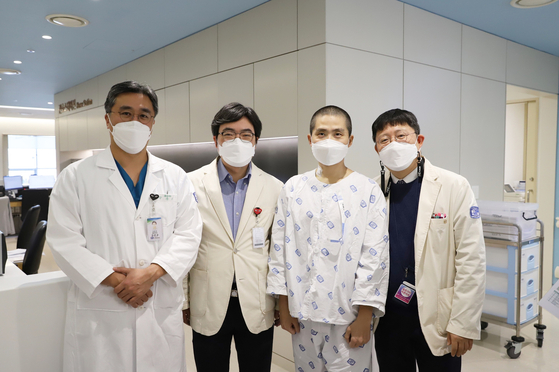
Medically, the’golden time’ that must be kept in order to safely transplant after the heart is excised in a brain-dead person is 4 hours. The Catholic University’s Eunpyeong St. Mary’s Hospital announced on the 8th that it was able to successfully complete the fourth heart transplant with the help of the Korea Railroad Corporation (KORAIL) and passengers. Eunbyeong St. Mary’s Hospital heart transplant team medical staff and Seo Min-hwan. Provided by Eunpyeong St. Mary’s Hospital
‘Golden Time’ is the minimum time that treatment, such as surgery, must be performed after an accident that can determine a patient’s life or death. Medically, the’golden time’ that must be kept in order to safely transplant after the heart is excised in a brain-dead person is 4 hours. The story of the firefighter who saved his life thanks to KTX, which delayed the departure time to keep this golden time, was known.
The Catholic University of Korea Eunpyeong St. Mary’s Hospital announced on the 8th that it was able to successfully complete the fourth heart transplant with the help of the Korea Railroad Corporation (KORAIL) and passengers. On January 13, at 7:49 pm, Eunpyeong St. Mary’s Hospital’s organ transplant center cardiac transplant extraction team succeeded in extracting the heart of a brain-dead person at Yeungnam University Hospital in Daegu. The remaining task was to deliver the donor’s heart as quickly as possible to the heart transplant team preparing for transplantation in Seoul.
Originally, the means of transportation the medical staff prepared for heart transport was a’helicopter’. However, on the evening of the operation, the weather in the central region worsened, making it impossible to operate the helicopter that the fire department had decided to support. With the heart already removed, the medical staff decided that they had to take the KTX heading to Seoul Station at 8:13 pm. The problem was time. Even if I ran from the hospital by ambulance, there was a high possibility that it would be 3 minutes later than the train departure time.

After acquiring the passengers’ understanding at the request of the medical staff, Korea Railroad Corporation adjusted the speed of the KTX operation before arriving at Dongdaegu Station to secure time to arrive at the destination three minutes later. After arriving at Seoul Station, the Korea Railroad Corporation secured the traffic line so that the heart could be quickly loaded into the ambulance again. Central photo
If the train departing at 8:13 was missed, the arrival time would be delayed for more than an hour, so the medical staff asked for cooperation with the Korea Railroad Corporation. After acquiring the passengers’ understanding at the request of the medical staff, Korea Railroad Corporation adjusted the speed of the KTX operation before arriving at Dongdaegu Station to secure time to arrive at the destination three minutes later. After arriving at Seoul Station, the Korea Railroad Corporation secured the traffic line so that the heart could be quickly loaded into the ambulance again.
At 10:20 pm, a donated heart from a brain-dead person was delivered to a heart transplant team in Seoul. It was 2 hours and 30 minutes after the extraction team left Daegu. The patient waiting for a transplant was 38-year-old Seo Min-hwan, an incumbent firefighter working at the Jongno Fire Department in Seoul. Seo was diagnosed with dilated cardiomyopathy as a result of a close examination after discovering an ECG abnormality at a medical examination in October 2019.
After that, Seo continued on medication, but in December of last year, the condition rapidly deteriorated and received extracorporeal membrane oxygen supply (ECMO, ECMO) treatment. After successfully undergoing surgery, Seo recovered from the intensive care unit for a week, then returned to health through a general ward and discharged the hospital 20 days after the surgery on the 5th.

Meanwhile, firefighters and colleagues all over the country who heard the news of the heart transplantation of Seo, a firefighter, delivered 500 blood donation certificates for blood transfusion to help Seo’s fight against the disease. Seo donated the collected blood donation to the organ transplant center at Eunpyeong St. Mary’s Hospital, asking for use for other transplant patients. News 1
Mr. Seo Min-hwan said, “I would like to express my gratitude to the medical staff who took care of the best in the whole process, from treatment to counseling to surgery so that I could regain my health, and to the many people who helped me get the surgery safely.” He said, “I will make more efforts to save precious lives as a firefighter by inheriting the will of the donor who gave new life through donation.”
“The patient was deteriorated enough to receive extracorporeal oxygen supply treatment for more than a week, but through careful pre- and post-operative management, the patient recovered faster than expected.” Of course, I am deeply grateful to the Korea Railroad Corporation for helping the brain-dead heart to be transferred quickly and safely. I hope that this heart transplant will contribute to the spread of organ donation culture and raising social awareness of organ transfer.”
Meanwhile, firefighters and colleagues all over the country who heard the news of the heart transplantation of Seo, a firefighter, delivered 500 blood donation certificates for blood transfusion to help Seo’s fight against the disease. Seo donated the collected blood donation to the organ transplant center at Eunpyeong St. Mary’s Hospital, asking for use for other transplant patients.
Reporter Lee Tae-yoon [email protected]
